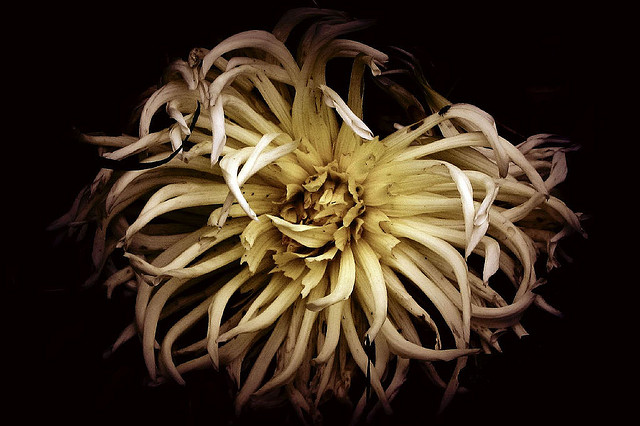“Quick River” and “What We Love Is Killing Us”
 Sometimes it takes a long time for me to find a poem in the material I’ve drafted; “Quick River” started several years before it found its course. It began as a series of images—light, leaves, river water—draped over a cerebral argument about the problems of suffering and attachment. I was just out of college then, and my interests in Zen Buddhism informed much of my thinking but had not yet manifested as more than an intellectual activity. I was engaged with the whiff of philosophy and the music in my earliest draft but, as I couldn’t locate meaning in it, I put the piece away. Several years later I returned to the draft and discovered that the poem is less an argument about clinging to experience than it is an elegy mourning a friendship altered by loss and distance. Working to guide the poem from its cool detachment and lyrical gestures to a complicated and uncertain place, I needed the speaker to be more than an observer; she had to become a participant. That her primary actions are watching, contemplating, and turning away were hard to write but were powerful to acknowledge.
Sometimes it takes a long time for me to find a poem in the material I’ve drafted; “Quick River” started several years before it found its course. It began as a series of images—light, leaves, river water—draped over a cerebral argument about the problems of suffering and attachment. I was just out of college then, and my interests in Zen Buddhism informed much of my thinking but had not yet manifested as more than an intellectual activity. I was engaged with the whiff of philosophy and the music in my earliest draft but, as I couldn’t locate meaning in it, I put the piece away. Several years later I returned to the draft and discovered that the poem is less an argument about clinging to experience than it is an elegy mourning a friendship altered by loss and distance. Working to guide the poem from its cool detachment and lyrical gestures to a complicated and uncertain place, I needed the speaker to be more than an observer; she had to become a participant. That her primary actions are watching, contemplating, and turning away were hard to write but were powerful to acknowledge.
Love and fear often throb at the same emotional register. The sweetness I once felt for the subject of “What We Love Is Killing Us” was born of my concern for his safety, and for my own, during a time when I was drawn to stark extremes of feeling. With some distance from this particular relationship, I found myself at my desk in what felt like another life entirely, hammering out a first draft. I was flooded with nostalgia and with surprise at the confluence of trouble and tenderness I recognized, dim and powerful, as though I were looking at an old photograph or talking to a familiar stranger. The poem came very quickly. I was teaching Romeo and Juliet at the time, and I can’t help but think that the iambic impulse and the dark counterpoint to the erotic in my poem came so automatically because I had been steeped in the play’s verse for weeks. Similarly, I think that the play inspired a preoccupation with artifice in my poem. The speaker hopes, perhaps blindly, that art and poetry itself can serve as a means of salvation. (Emily Pulfer-Terino)
—
Quick River
I don’t know which is worse: suffering, or the arguments against it.
We hurt. Or argue that we hurt because we cling to a world
as transient as the seasons, as though detachment would help. I thought
it would be easier if my friend were just a sum of my stories about her. In one,
she was pretty and strong, smart and sullen. In another, she took photographs
of light on womens’ bodies. In one story, she was folding clothing slowly,
slowly, in the corner of the room, so the cloth would keep her order.
And in one, her mother’s mind was going, swelling, full of extra cells,
emptying herself of what she’d known. That’s how I chose to think about it.
It was summer then, and I was burning. I left her and lay by the quickest river,
burning with the stones that sprawled to the cool, dark water working
through the trees. I was burning, while water coursed over the riverbed, away,
appearing bright and blank as sun, invisible as no sun. I chose to think
that no one I knew had to hurt, or had to suffer loss. Still, I knew I had a friend
and loved her, loved the way she scolded, bowed her head in laughter,
as though jokes she made were for a self inside her. And when her mother died,
her eyes grew huge, and hard, as suns, or stones, with grief. They stayed that way.
—
What We Love Is Killing Us
is what we thought that summer when rain drove
into gardens, loosening bulbs—dahlias lolling
in their beds—and he’d drive us, drenched in want
and vodka, to his place where we stared, stumbling,
at stars whose strings of animals and lusty gods
erupted above the prefab arbor; sky gone blank.
It’s true, in part: I drank and starved.
He kept a switchblade by the bed in case.
But what we love did also keep us whole. Old
Chinese poems we read in dim translation
turned words into mountains, into our lost friends, mist,
while the world around us, actual and towel-heavy,
blurred. Tired, we’d try to scry originals:
the lash-dark glyphs turned first to lines, then nothing.
How to explain? This man I love, whose mind
drove into language, rain, his wrists, in whose hands
I’d loosen and bruise—blue-brown roses blooming
from my throat—this man who meant, so many nights,
to take his life, how to tell him that what we love
is what keeps us alive a while, or it ought to.
—
 Emily Pulfer-Terino grew up in Western Massachusetts, where she lives and teaches English at Miss Hall’s School, a boarding school for girls. She holds a BA from Sarah Lawrence College and an MFA in Creative Writing from Syracuse University. More of her work is published or forthcoming in Hunger Mountain, Stone Canoe, The Louisville Review, The Southeast Review, The Alembic, Oberon, Numéro Cinq, and other journals and anthologies.
Emily Pulfer-Terino grew up in Western Massachusetts, where she lives and teaches English at Miss Hall’s School, a boarding school for girls. She holds a BA from Sarah Lawrence College and an MFA in Creative Writing from Syracuse University. More of her work is published or forthcoming in Hunger Mountain, Stone Canoe, The Louisville Review, The Southeast Review, The Alembic, Oberon, Numéro Cinq, and other journals and anthologies.
